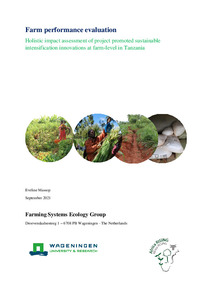Farm performance evaluation: Holistic impact assessment of project promoted sustainable intensification innovations at farm-level in Tanzania
Abstract
Smallholder farmers in Sub-Saharan Africa are characterized by low inputs and consequently low productivity. They are mostly self-sufficient but struggle to meet their own nutritional demand. With a fast-growing population there are even more mouths to feed, but agricultural production is threatened by the consequences of climate change. Sustainable intensification is considered a solution for this complex situation, and the Africa Research in Sustainable Intensification for the Next Generation is one of several projects promoting sustainable intensification. This thesis provides a holistic assessment of the project in Tanzania, based on a household survey which included 579 households in Babati, Kilolo, Kongwa and Mbozi districts. The aim was to identify whether farms with a better sustainable intensification performance had more innovations implemented and which combinations of innovations could contribute to this performance. Hierarchical Cluster Analysis was used to identify combinations of innovations, and based on the Sustainable Intensification Assessment Framework several indicators were used to assess performances per cluster. Positive Deviant analysis, based on Pareto-optimality and above average performances for selected indicators, was used to identify farms that performed extraordinarily better. Ten innovation clusters were identified, and the farms in five clusters that used more innovations also had a better performance. A large majority of farms in the better performing clusters made more use of fertilizers, compared with lower performing clusters. There were 52 farms identified as Positive Deviants, and these farms made more use of innovations which were not widely represented in the innovation clusters. The majority of the farms was found in well performing clusters, however the most of these well performing farms and the Positive Deviant farms still used considerable amounts of pesticides, which conflicts with sustainable intensification and thus requires attention for future improvements.

